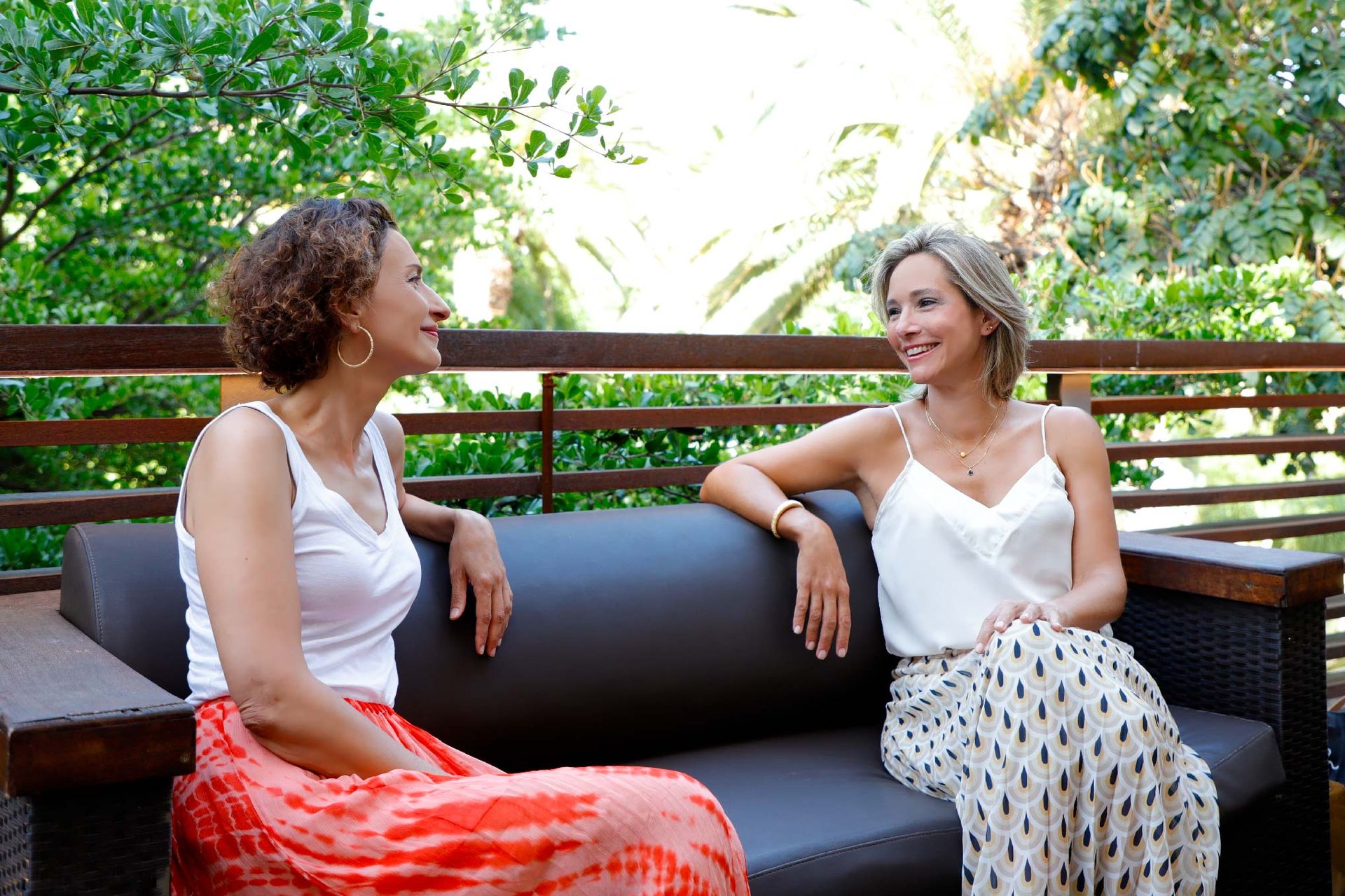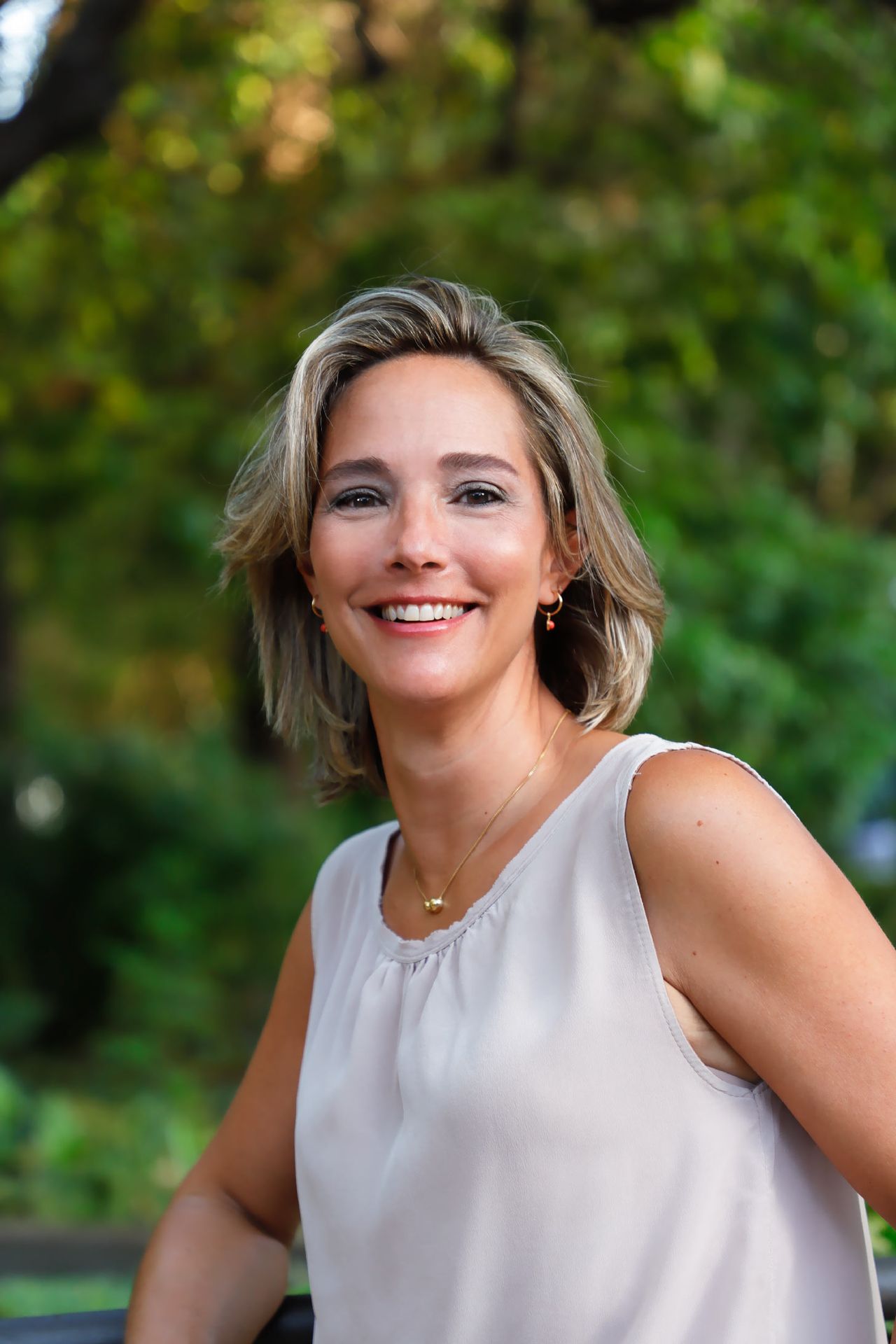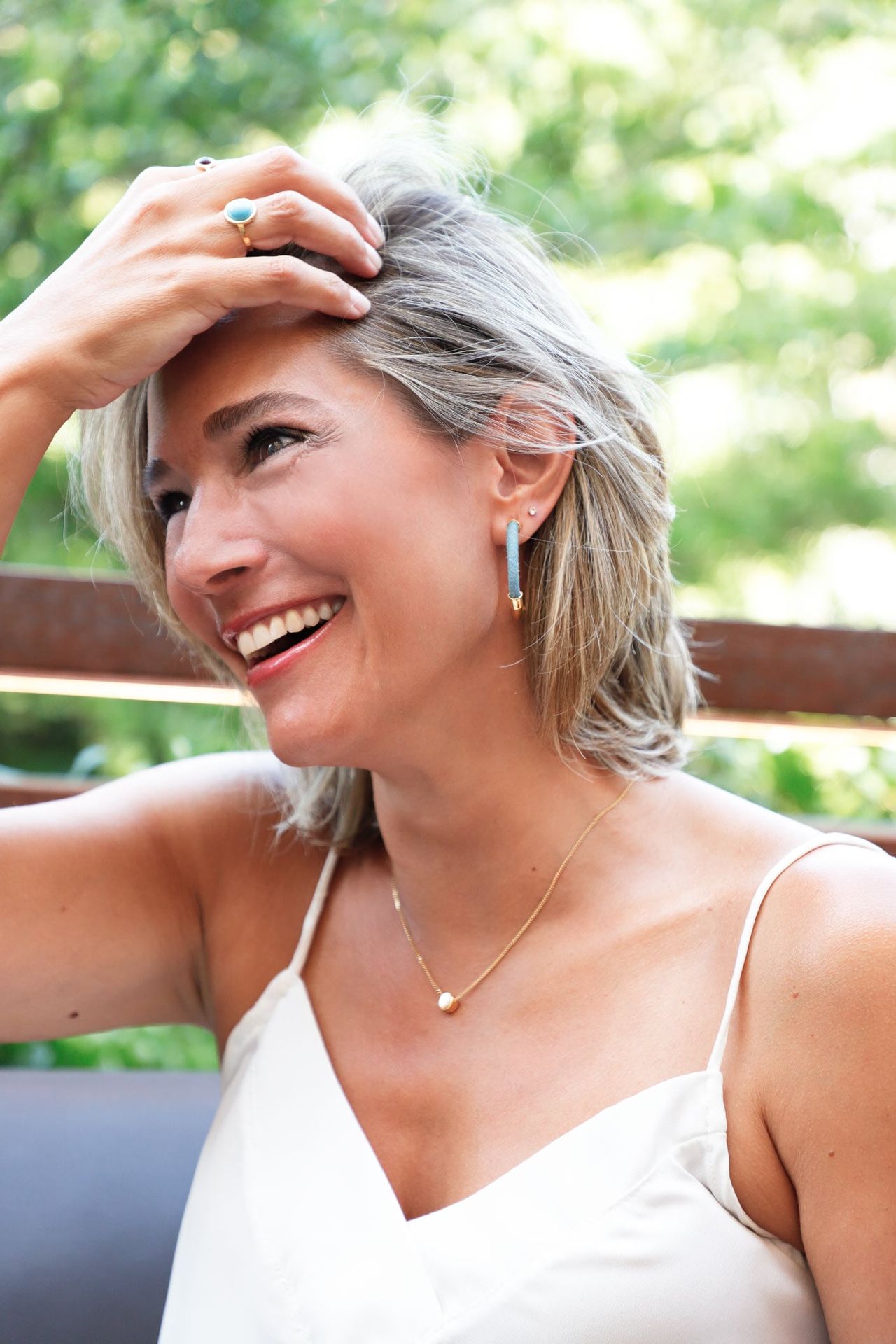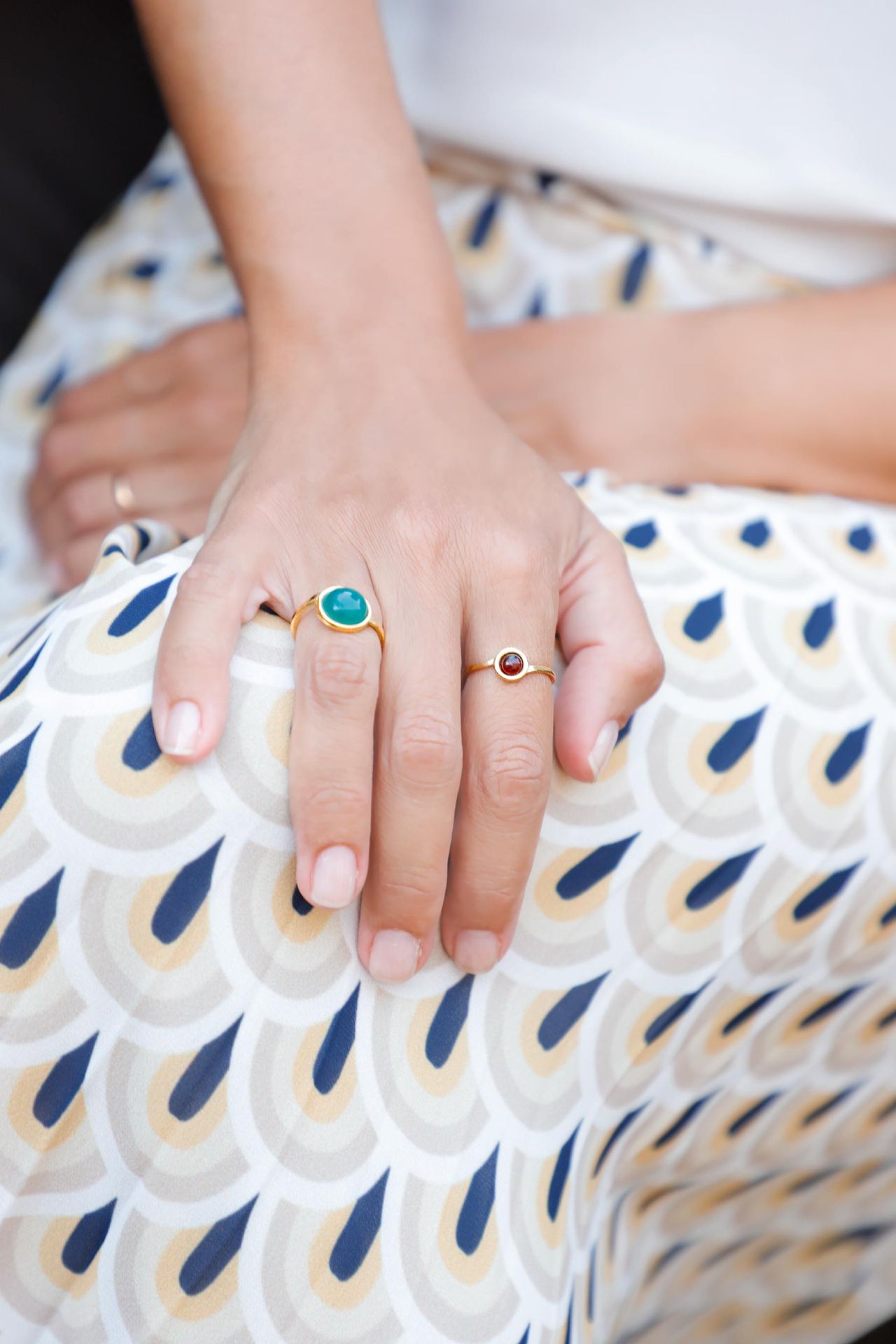We love to get to know and share talent, especially when it’s about women, as our brand is mainly addressed to the them. Some time ago we started to share the story of women who spire us for different reasons, women who help us grow and show us that everything is possible.

Teresa and I met some years ago through some friends. Since the very beginning, I was striked by her charm and energy, with an amazing ability to squeeze life in every sense. My inicial curiosity rose when whe told me she was a women in the science world.
Teresa is a brilliant researcher specialised in Biophisycs, Phisiology and Neuroscience. After getting her career and PhD by Spanish and US universities, she combines her research activity with teaching at the University of La Laguna. Her work has been recognized by the scientific community with prestigious awards. She is passionate, humble, curious and femininine, with a job that aimed to improve the human quality of life, whe is an inspiration to us. We spent a fun summer afternoon, sharing some lovely stories, such as her aunt who celebrated good news buying jewels for herself.
We are living in a pandemia era caused by the COVID-19. How did you live the confinement and what was your experience?
It’s been a hard process. The work load has multiplied and being at home everyday is something I’m not used to (specially being locked down). Teaching at the university has suddenly transformed from on-site to online, which needs an adjustment period and a lot of work, if you want to do it right. It’s a great responsibility, as the students are frightened and worried, and we must warranty they can keep working. In the research activity, I have 9 people depending on me, and I feel concerned about their future. At home, leaving with two teenagers has also been a challenge. So from every standpoint it’s been a stressful period that has had an impact on my health. On the other hand, I am aware that we are very lucky to go through this with personal and economic stability. So we have tried to face this with a positive and grateful attitude.
As I understand, your job is focused on understanding how to improve the fascinating functioning of the brain to combat illnesses such as epilepsy, migraine or muscular dystrophy. Could you let us know in detail what is your job about in the research realm and what is your contribution to the science world?
I love my job. In my team we use electrophysiology molecular techniques, molecular biology, microscopy and genetics to study neurons (the cells that form our brain) at a molecular level. We know since a long time ago that neurons work using ionic electricity (many systems of our body use it, as the muscle and the heart). We can ask those systems and see how they are altered by similar processes to illness. Specifically, we work with some proteins called ion channels, that are literally tiny “holes” in the cells (neurons in this case) that open and close in a very controlled way, to regulate that pah of ionic electricity. It is a complex mechanism that is regulated in an exquisite way, like a musical score. When it fails (just like when a musical note is not well played), the balance fails and an illness can occur.
In the science world, in my lab we work in something called biophysics of ion channels. There is a huge community in the world dedicated to understand how those proteins work. Understanding at an almost atomic level how they work, we can understand how to treat illnesses when they fail, at different levels.

Women in science: the path to diversity
You have been trained and worked in the US and Spain. What are the differences you have experienced in both realms in the professional world?
As in everything, there are positive and negative issues in both places. In general, even though the world is upside down at this momento, the US usually supports science strongly at a social, political and economic level. The work of a University profesor is very well recognized, both at a cultural and economic level. There is an indivisible link between teaching and reserching, having this latter a huge importance. That is the main difference with Spain. In second place, the research investment in the US is significantly larger than in Spain, so that working capacity and results cannot be compared. Besides, American cultura is very dynamic, and departments are very diversed, with people coming from all over the place, which provides a very diverse and interesting environment, as opposed to Spain. However, Spain, and specially the Canary Islands, has a wonderful quality of life, and that weights very much in the balance. Having the family closed and working in interesting projects helped us decide to establish ourselves here. At the end of the day, it’s a matter of balancing the professional, emotional and personal worlds
One of your goals is to promote scientific awareness and the role of women in science, collaborating with many committees both at a national and international levels. How do you approach women contribution to science?
Women have a lot to offer in every field. Women integration in the scientific realm is a further step towards the most important goal as a community, which is real diversity. History has so far developed in a too “monographic” atmosphere, where organization schemes and many values have only taken one sector into account. In fact, the sector I mean is a masculine sub-sector (not even this sector as a whole). This is the way our history has worked, and unfortunately there’s nothing we can do. In fact, I think we must be positive and learn about the successes and mistakes we’ve gone through. But we can’t go on like this. Diversity has proven to be the base for success and the world is not only formed by that sector of the population. There are men and women, different etnias, diferent nationalities and cultures, and we all can and must contribute to grow together. Science does not scape from that fact, and there is evidence that a bigger productivity and creativity comes from diverse groups.

Science and fashion: knocking down clichés
Were there women who inspired you and served as an example for you?
Yes, in many realms. To start with, my mother and grandmother, who have always been a reference to me and have been wonderful counselors in my life. I also have two sisters who I adore and are really different from me and between them, and that has also been important and enriching. I also feel lucky to have been inspired by remarkable women scientists who I feel closed to and who have supported and encouraged me throughout my career. And they still do. Barbara Ehrlich (profesor at Yale University), Gail Robertson and Cindy Cajkowski, professors at the University of Wisconsin. I also have an excelent network of coleagues with whom I’ve been growing professionally. We support each other at moments of crisis J In general, I think I have been inspired by many people (not only women). I think that our personality is shaped by all those persons that are part of our life (both those that contribute in a positive way and negative way). My list is huge, most of those people don’t know how much they had an influence in me with a word, a gesture or a quick advice. But they did.
You work in a scientific realm and, as you say, women presence is growing. I am curious about the perception of women image in that atmosphere. In your case, you have an interest in fashion and in your image, do you think this could be considered as something negative?
This is a very interesting question. In fact, this is a very common cliché in our realm. Even though we cannot generalize (as in almost anything), there is a sector of our community that associates women scientists with a slobby or sloppy image, as if taking care of your personal image were incompatible with being a women scientist. More than once, I have heard the comment “I can’t believe you are a scientist”. There’s a perception that we had to choose between being beautiful (even though beauty is a subjective matter) or smart. But you can’t be both at the same time. This occurs with other issues as well, such as between being a good professional or a good mother, for instance. It seems like trying to have it all is not an option. I think this is an enormous social pressure that is harmful for us and prevents us from being happy. We must avoid it. To me, we can have almost all, being aware that noone and nothing is perfect. At least, we have all the right to try, without anyone preventing us to do it just because, or for nonsense conventions.
Teresa con nuestros anillos Chloe
You already knew Hissia. What do you think about our brand?
I really love your designs. I love your story, I think it reflects what I just said: your brand is a story about making things right, follow your dreams and launch into an adventure. Tome, it’s really exciting to see how you have acomplished that. I’m proud to be part of this adventure as a customer.
You were telling us your Chloe rings are becoming a talisman that you always wear when you have something important…A required question for all our ‘hissia girls’, what’s your favorite piece?
I love the Chloe rings and during confinement I got myself the Green onyx and gold stacking ring Chloe! And I’m going to pamper myself with the Gold hoop earrigns Jean!
You are a successful professional and also a mom. As a mother myself, and probably as many of our readers, we face our kids’ education as a challenge. Do you have any advice for those young girls and boys that are thinking about how to navigate their profesional future?
I think my advice is not to be influenced by their envirornment and to be sure that they are taking their own decissions, although I know that’s hard. In my opinión, the key is to stop and think about what we want in a long term, not in a short term. Where would you like to be in 10-20 years? What would you become in life? Where would you like to spend your life? And then decide according to that. It’s a hard work, but necessary. On the other hand, we can’t take decisions based on what we would like to avoid (“I don’t want to study science because I hate math”). We must face that in order to achieve goals we will have to make sacrifices and going through things we don’t like. This is inevitable. That’s why we must analyze where we would like to get and go ahead, knowing the ride will have it’s difficulties, but it will kind of take it where we’d like to get. And, as I said before, we must take into account that perfection doesn’t exist. So we must take a risk knowing that things can change and our goals to. In order to achieve our goals, we must take our own responsibilities and not blame the others for our failures. This is the only way to achieve them.
